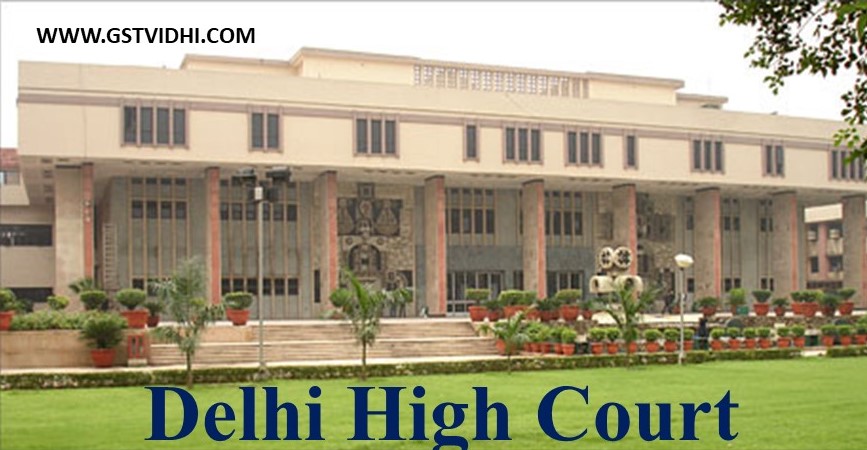
AB Enterprises vs.
Commissioner of Delhi Goods and Services Tax
Case Number: W.P.(C)
No.7919/2023
Court:
High Court of Delhi
Date of Decision:
21.11.2023
Coram:
Honourable Mr. Justice Vibhu Bakhrū and Honourable Mr. Justice Amit Mahajan
Summary of the Case:
The petitioner, AB Enterprises, challenged a communication
issued under Form GST RFD-03 dated 06.04.2022, which identified
deficiencies in its refund application for unutilized Input Tax Credit (ITC)
related to zero-rated supplies. The petitioner claimed compliance with Rule
89(2) of the CGST Rules and argued that the alleged deficiencies were outside
the scope of this Rule. The High Court held that the refund application was
valid under Rule 89(2), set aside the impugned communication, and directed the
department to process the refund application in accordance with law.
Key Facts:
1.
Background:
o The petitioner engaged in zero-rated supplies (exports of
goods) and filed a refund claim for unutilized ITC.
o The refund claim of ₹54,86,530 pertained to exports made in
December 2021 and was filed on 24.03.2022 using Form GST RFD-01.
2.
Documents
Submitted by the Petitioner:
The petitioner supported its application with the following documents (as noted
by the GST portal and acknowledged by the department):
o Form RFD-01
o Statement 3
o Computation of refund claimed
o Declaration as required under Section 54(3)(ii) of the CGST
Act
o Undertaking under Section 16(2)(e) and Rule 42 of CGST/SGST
Rules
o Annexure B (GSTR-2A details)
o A statement containing invoice and shipping bill details.
3.
Impugned
Action:
o The GST department, via Form GST RFD-03, cited two
deficiencies:
1.
"Relevant supporting documents
not attached."
2.
"Supporting documents attached
are incomplete."
o However, the communication lacked specificity, failing to
mention which documents were missing or incomplete.
4.
Additional
Demand by the Department:
In its counter-affidavit, the department claimed that the following documents
were missing:
o Shipping bills/transport bills of lading
o Copies of invoices
o GSTR-3B statement
o CA-audited certificate
o Undertaking under Rule 96B of the CGST Rules
o Bank Realization Certificate (BRC).
5.
Petitioner’s
Grounds of Challenge:
o The petitioner contended that all documents required under Rule
89(2) of the CGST Rules were already submitted.
o It argued that the additional documents demanded were beyond
the scope of Rule 89(2).
o The vague and generic communication under RFD-03 lacked clarity,
violating the principles of natural justice.
Submissions:
Petitioner’s Argument:
1.
The petitioner had filed all
mandatory documents as per Rule 89(2) of the CGST Rules.
2.
Additional documents demanded by the
respondent were not specified in the Rule and thus could not render the
application deficient.
3.
Requiring the petitioner to file a
fresh application (as implied under Rule 90(3)) was unjustified when the
initial application was compliant.
Respondent’s Argument:
1.
The respondent claimed the documents
listed above (e.g., shipping bills, GSTR-3B, CA certificate, etc.) were
necessary for processing the refund application.
2.
They argued that deficiencies in
these documents rendered the application incomplete.
Court Findings:
1.
Compliance
with Rule 89(2):
o The court confirmed that Rule 89(2) of the CGST Rules
specifies a finite list of documents required for refund applications.
o The petitioner had submitted all the mandatory documents
listed in Rule 89(2).
o Additional documents demanded by the department were not
covered by Rule 89(2) and could not be grounds for rejecting the application.
2.
Vague and
Deficient Communication:
o The impugned communication under Form GST RFD-03 was
found to be vague and non-compliant with procedural requirements.
o The court criticized the department for failing to specify
the exact deficiencies in the communication, violating natural justice
principles.
3.
On
Additional Documents:
o The court clarified that while the department could request
additional documents for verification, such requests should be made separately
and should not affect the validity of the refund application.
4.
Precedent
Reference:
o The court referred to its earlier decision in National
Internet Exchange of India vs. Union of India (Neutral Citation
No.2023:DHC:6002-DB), which held that a refund application could not be
rejected as deficient if it complied with Rule 89(2).
Judgment:
1.
Setting
Aside the Communication:
o The court set aside the impugned communication (Form GST
RFD-03).
2.
Directions
to the Department:
o The department was directed to acknowledge the refund
application as compliant under Rule 90(2) and process it in accordance with
law.
o The department was permitted to request additional documents
or information for verification, but this would not invalidate the application.
3.
Processing
Timeline:
o The department must process the refund application without
relegating the petitioner to file a fresh application under Rule 90(3).\
Conclusion
The case emphasizes strict adherence to procedural
safeguards under GST law, ensuring taxpayers' refund applications cannot be
rejected arbitrarily. The judgment underscores the limited scope of Rule 89(2)
for determining deficiencies and prevents misuse of administrative discretion.
Disclaimer: All the Information is based on the notification, circular and order issued by the Govt. authority and judgement delivered by the court or the authority information is strictly for educational purposes and on the basis of our best understanding of laws & not binding on anyone.
Click here